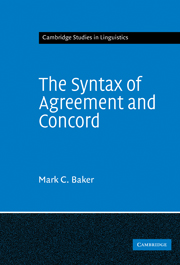Book contents
- Frontmatter
- Contents
- Acknowledgments
- List of abbreviations and conventions
- 1 Introduction: category distinctions as a window on the theory of agreement
- 2 Basic agreement and category distinctions
- 3 The unity of verbal and adjectival agreement
- 4 Explaining the restriction on person agreement
- 5 Parameters of agreement
- Appendix: Table of languages and their agreement properties
- References
- Index
4 - Explaining the restriction on person agreement
Published online by Cambridge University Press: 12 January 2010
- Frontmatter
- Contents
- Acknowledgments
- List of abbreviations and conventions
- 1 Introduction: category distinctions as a window on the theory of agreement
- 2 Basic agreement and category distinctions
- 3 The unity of verbal and adjectival agreement
- 4 Explaining the restriction on person agreement
- 5 Parameters of agreement
- Appendix: Table of languages and their agreement properties
- References
- Index
Summary
Most of the ingredients of the theory of agreement in the previous two chapters are either fairly standard or generalizations of notions that are fairly standard. The notable exception is the Structural Condition on Person Agreement (SCOPA), repeated in (1).
F can agree with XP in +1 or +2 only if a projection of F merges with a +1 or +2 element and F projects.
This highly specific condition is not part of standard theory. Section 3.3 gave a range of evidence showing that this condition correctly characterizes when verbs can and cannot agree in person with their arguments, in addition to ruling out first and second person agreement on adjectives quite generally. But as it stands, (1) is merely a descriptive generalization. The purpose of this chapter is to explore the SCOPA more thoroughly.
To accomplish this, I begin by investigating when person agreement is possible on categories other than nouns, verbs, and adjectives, confirming that the SCOPA is descriptively correct (section 4.1). I then go on to derive the SCOPA from more fundamental principles which go to the heart of what it is for any linguistic expression to be first or second person. The first step in this derivation is to distinguish the relationship of Agree that holds between a functional head and a nearby NP from the sort of agreement that holds between operators and the variables that they bind (section 4.2). I claim that first and second person agreement belongs properly to operator-variable agreement and not to Agree per se. It is not particularly surprising, then, that the two are subject to different formal conditions.
Information
- Type
- Chapter
- Information
- The Syntax of Agreement and Concord , pp. 111 - 152Publisher: Cambridge University PressPrint publication year: 2008
